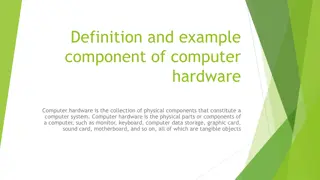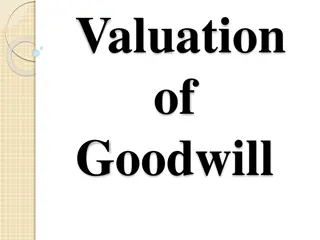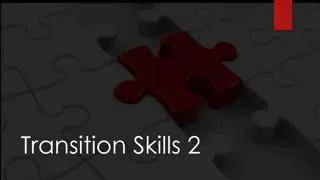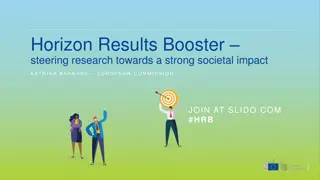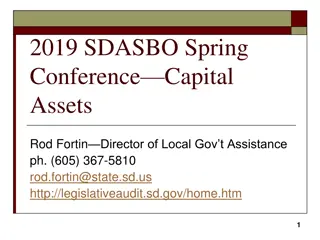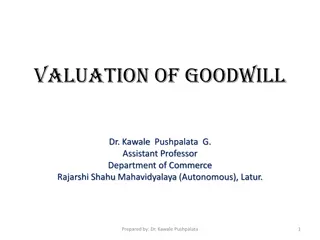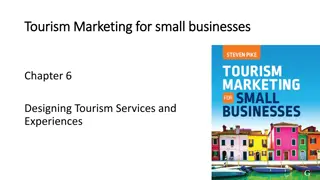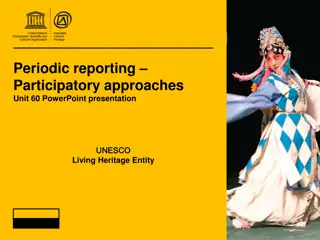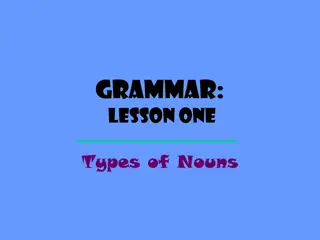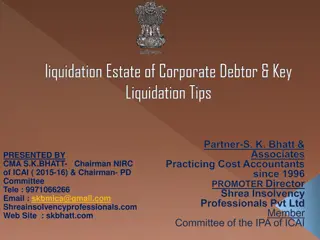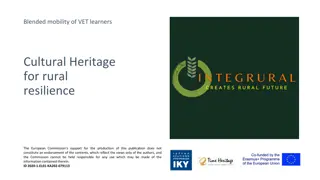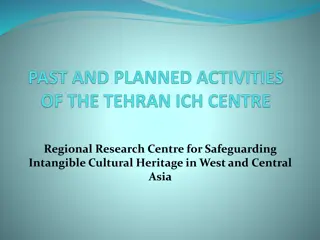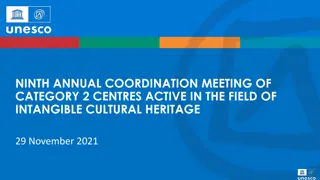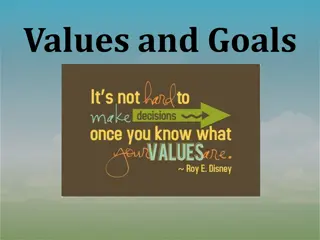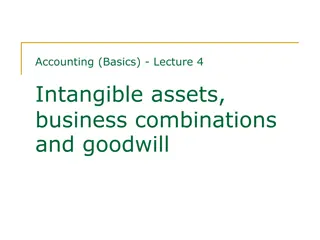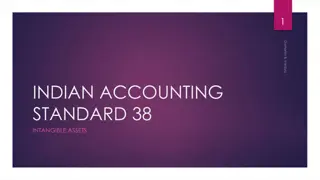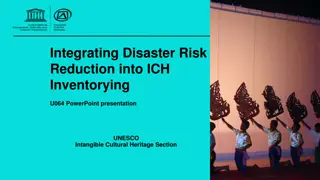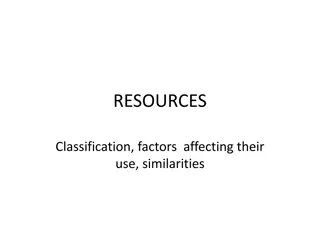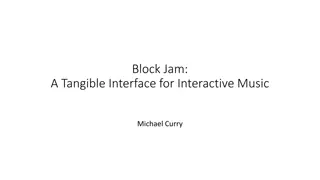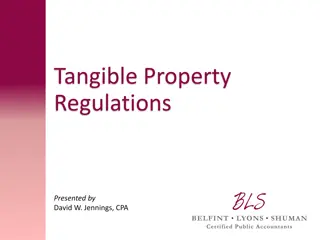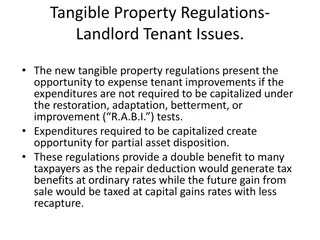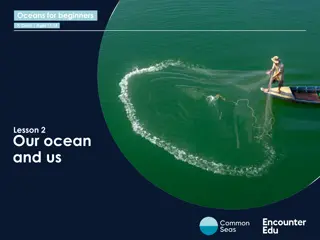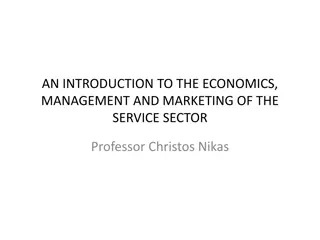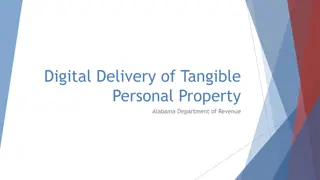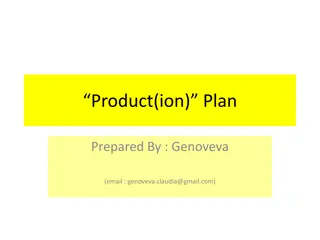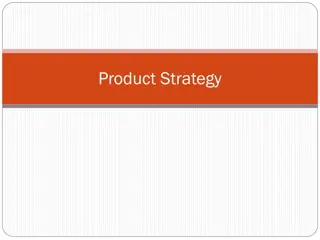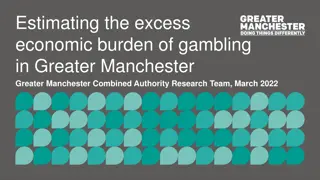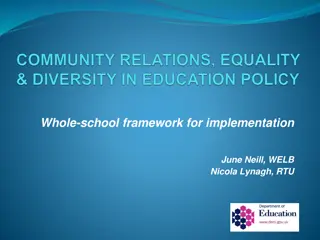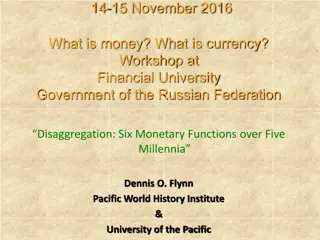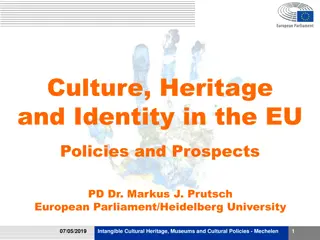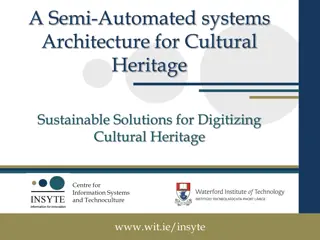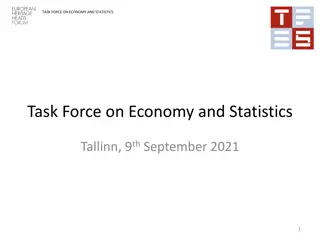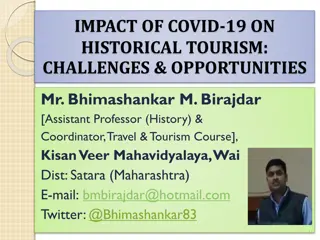Proposed Ratification of the 2003 Convention on Safeguarding Intangible Cultural Heritage
The briefing presents a proposal for the ratification of the 2003 UNESCO Convention on Safeguarding Intangible Cultural Heritage (ICH). The Convention aims to safeguard, preserve, and promote ICH, which includes practices, knowledge, skills, and cultural spaces passed down through generations. It em
0 views • 19 slides
Understanding the Significance of Goodwill in Partnership Accounts
Goodwill plays a crucial role in partnership accounts, requiring adjustments during changes in profit-sharing ratios or when partners are admitted, retire, or pass away. It represents the intangible value attributed to a business's reputation and potential for future profits, influenced by factors l
3 views • 10 slides
Types of Business Expenditure and Capital Expenditure Explained
Learn about the different types of expenditure in business, including capital expenditure on non-current assets like tangible and intangible items, and revenue expenditure for day-to-day trading activities. Explore examples such as machinery, goodwill, patents, trademarks, and more. Understand the d
3 views • 11 slides
Understanding the Relationship Between Intangible Cultural Heritage and Disaster Risk Reduction
This PowerPoint presentation by UNESCO explores the connection between Intangible Cultural Heritage (ICH) and Disaster Risk Reduction (DRR). It covers key concepts like disasters, risks, vulnerabilities, and resilience, emphasizing the importance of safeguarding and mobilizing ICH in the face of dis
7 views • 23 slides
Contrasting Retail Marketing and Service Marketing
Retail marketing focuses on tangible goods, emphasizing product-centric strategies like merchandising and inventory management. In contrast, service marketing centers on intangible services, prioritizing customer relationships, service quality, and customization to meet individual needs. Both share
1 views • 4 slides
Overview of Computer Hardware Components and Software Functions
Computer hardware components such as monitor, CPU, mouse, and projector are essential physical parts of a computer system, while software includes intangible programs like operating systems and utility software. Hardware components perform tasks like displaying data, processing information, and prin
8 views • 9 slides
Understanding the Valuation of Goodwill in Business
Goodwill in business refers to the intangible value derived from the reputation, customer connections, and other advantages of a company that contribute to higher profits. Valuation of goodwill is crucial when selling a business, admitting new partners, amalgamating firms, or determining share value
2 views • 32 slides
Understanding Success in Sixth Form Education
Exploring the differences between studying at GCSE and A level, this discussion emphasizes the essential skills for success in Sixth Form, beyond academic achievements. Contrary to common beliefs, intelligence and GCSE performance do not dictate A level success. Instead, the focus is on developing i
0 views • 36 slides
Enhancing Research Impact Through Horizon Results Booster
Horizon Results Booster is a free-of-charge service provided by the European Commission aimed at maximizing the impact of research and innovation projects. It focuses on improving exploitation potential, implementing dissemination strategies, and increasing access to markets and policymakers. The se
0 views • 8 slides
Understanding Capital Assets and Financial Reporting
This presentation delves into the world of capital assets, focusing on their categorization, ownership, and reporting in financial statements. Key topics include the distinction between tangible and intangible assets, responsible asset management, and the implications of capital leases on ownership.
0 views • 61 slides
Understanding Goodwill Valuation in Business
Goodwill in business represents the intangible value of a company beyond its tangible assets. This article covers the meaning of goodwill, factors affecting its valuation, methods of valuation such as simple average profit method, and considerations before calculating average profits. An illustrativ
0 views • 13 slides
Enhancing Tourism Services through Co-Creation and Memorable Experiences
Explore the essence of service value co-creation in the tourism industry, transitioning to the experience economy, and designing engaging experiences for customers. Learn about the pivotal role of frontline staff, utilizing intangible resources, and empowering employees for superior customer engagem
0 views • 20 slides
Community Engagement in Safeguarding Intangible Cultural Heritage
Encouraging community participation, involving various stakeholders, and prioritizing ethical principles are essential in safeguarding intangible cultural heritage. This presentation explores different interests, roles, and areas of expertise, emphasizing the importance of engaging non-governmental
0 views • 20 slides
Understanding Types of Nouns: Common, Proper, Concrete, and Abstract
This educational content delves into the different types of nouns, including common nouns that refer to general entities, proper nouns that denote specific names, concrete nouns that are tangible, and abstract nouns representing intangible ideas. Explore examples and classifications to enhance your
0 views • 14 slides
Understanding Liquidation Estate and Key Asset Components
In the process of liquidation, the liquidator forms an estate comprising various assets of the corporate debtor for the benefit of creditors. These assets include ownership rights, tangible and intangible assets, proceeds of liquidation, and more. However, certain assets owned by third parties or he
0 views • 39 slides
Understanding Cultural Heritage: A Comprehensive Overview
Cultural heritage encompasses tangible and intangible aspects passed on through generations, shaping identities and preserving human experience. This publication explores the significance of cultural heritage in different contexts and highlights its preservation, enhancement, and economic potential.
1 views • 17 slides
Regional Research Centre for Safeguarding Intangible Cultural Heritage in West and Central Asia
The Regional Research Centre focuses on safeguarding intangible cultural heritage in West and Central Asia as per its geographical mandate. It carries out actions like networking, research, information dissemination, and capacity-building. The Centre's membership includes 11 member countries, with v
1 views • 16 slides
Updates and Priorities in Intangible Cultural Heritage Sector
LATEST DEVELOPMENTS: Ninth Annual Coordination Meeting of Category 2 Centres in Intangible Cultural Heritage field discussed key initiatives and strategies. UNESCO's Medium-Term Strategy and Programme & Budget focus on enhancing heritage protection, education, and climate action. Evaluation by UNESC
0 views • 13 slides
Understanding Values, Goals, and Success
Values are integral to our lives, guiding our actions and choices. They can be tangible or intangible, shaping our decisions and defining our character. The value cycle illustrates the impact of staying true to our values or compromising them. Goals, on the other hand, are plans we create to achieve
0 views • 8 slides
Understanding Intangible Assets and Business Combinations in Accounting
In accounting, recognition of intangible assets as assets requires the expectation of future economic benefits flowing to the entity and reliable measurement of the asset's cost. Intangible assets acquired separately are recognized based on their fair value, while those acquired in business combinat
1 views • 23 slides
Understanding Intangible Assets in Indian Accounting Standard 38
This content delves into Indian Accounting Standard 38 focused on intangible assets. It covers definitions, scope, recognition, initial measurement, subsequent measurement, and treatment of self-acquired intangible assets. The guidelines on research and development expenditure, subsequent expenditur
0 views • 14 slides
Integrating Disaster Risk Reduction into ICH Inventorying for UNESCO
Learn how to apply a community-based approach to inventorying and safeguarding intangible cultural heritage within the context of disasters. This presentation offers frameworks, tools, and exercises to integrate disaster awareness into ICH inventorying and safeguarding practices, emphasizing the imp
0 views • 15 slides
Understanding Resources: Classification, Factors, and Similarities
Resources play a vital role in satisfying our needs and achieving our goals. They can be tangible or intangible, material or human attributes. This includes time, energy, knowledge, skills, abilities, and more. Human resources originate internally and are inherited with unlimited knowledge. Skills a
0 views • 13 slides
Block Jam: A Tangible Interface for Interactive Music
Block Jam, designed by Sony CSL in the early 2000s, is a tangible interface for sequencing music using functional units called Blocks. Users manipulate music through Blocks that connect to sequencing software, enabling easy music creation and encouraging cooperative musical experiences. User studies
0 views • 8 slides
Understanding Tangible Property Regulations and Improvements
Explore the guidelines presented by David W. Jennings, CPA regarding tangible property regulations and determining the unit of property. Learn about amounts paid to improve tangible property, how to determine the unit of property, specifics related to buildings, and definitions of improvements and b
0 views • 17 slides
Understanding Tangible Property Regulations in Landlord-Tenant Issues
The new tangible property regulations offer the opportunity to expense tenant improvements without capitalization if they pass certain tests. Different rules apply when determining the unit of property (UOP) for leased buildings, impacting how expenses are categorized. Landlords may benefit from rep
0 views • 17 slides
Exploring Ecological Goods and Services in Our Oceans
Delve into the fascinating world of ecological goods and services provided by our oceans. Discover the tangible products and intangible benefits humans derive from marine ecosystems, including provisioning services like food and raw materials, regulating services such as climate regulation and coast
0 views • 14 slides
Understanding the Dynamics of the Service Sector
Explore the realm of services in the context of economics, management, and marketing with a focus on defining services, the challenges faced by service providers, and the classification of services. Learn the key differences between goods and services, and the shift of the global economy towards the
0 views • 94 slides
Understanding Taxation of Digital Goods and Tangible Personal Property in Alabama
Explore the taxation laws in Alabama regarding the digital delivery of tangible personal property and the classification of tangible personal property in sales tax cases. This content delves into specific court cases, definitions, and perspectives on the taxability of digital goods and software purc
0 views • 10 slides
Understanding Product Classification and Diversification Strategies
Explore the classification of products into tangible goods and intangible services, along with consumer product categories like convenience, shopping, and industrial products. Learn about product diversification with examples from companies like Unilever. Discover the product life cycle and unique p
0 views • 9 slides
Understanding Product Strategy and Classification in Marketing
Products play a crucial role in marketing, encompassing tangible, intangible, and augmented aspects to satisfy consumer needs. This comprehensive overview covers the levels of a product, core benefits, classifications (consumer and industrial), and the importance of aligning products with customer p
0 views • 32 slides
Understanding Balance Sheets and Income Statements in Financial Reporting
Balance sheets provide a snapshot of a company's assets, liabilities, and shareholders' equity at a specific point in time, with assets listed on the left and liabilities and equity on the right. Current assets are those expected to be converted into cash within a year, while non-current assets are
0 views • 34 slides
Economic Burden of Gambling in Greater Manchester 2022
Economic analysis reveals the estimated excess economic burden of gambling in Greater Manchester in 2022 is at least £80m, encompassing direct costs to the public purse and societal costs. The harms include treatment for depression, imprisonment, unemployment benefits, statutory homelessness, alcoh
0 views • 40 slides
Reflecting on School Ethos and Culture for Continuous Improvement
The provided content delves into the importance of school ethos and culture in fostering a vibrant learning environment. It emphasizes the need for schools to be communities of good practice that cater to individual pupil needs and aspirations, preparing them for a diverse and equal society. The mat
0 views • 19 slides
Evolution of Monetary Functions: From Ancient Mesopotamia to Modern Economics
Delve into the origins and development of monetary functions throughout history, from the use of silver shekels in Mesopotamia to the complexities of modern currency systems. Explore the evolution of money's roles as a unit of accounting, medium of exchange, store of value, and more, shedding light
0 views • 8 slides
Cultural Heritage and Identity in EU Policies
Delve into the significance of cultural heritage and identity in European Union policies through a presentation discussing the evolution of heritage, European identity concepts, and EU heritage policies since the 1970s. Explore the intertwined nature of cultural heritage with European integration an
0 views • 11 slides
Semi-Automated Systems Architecture for Cultural Heritage at Centre for Information Systems and Technoculture
Explore the innovative semi-automated systems architecture for cultural heritage sustainability and digitization at the Centre for Information Systems and Technoculture. Professor Michael Cooley leads research projects focusing on digitization techniques, library metadata standards, and advanced dig
0 views • 9 slides
Task Force on Economy and Statistics: Impact of Cultural Heritage on Society and Well-being
The Task Force on Economy and Statistics is involved in studying the influence of tangible and intangible cultural heritage on societal well-being, particularly in the context of the COVID-19 crisis. Through pan-European analyses and surveys, they gather data on individual perceptions and behaviors
0 views • 7 slides
Impact of COVID-19 on Historical Tourism: Challenges & Opportunities
The impact of COVID-19 on historical tourism has been significant, posing challenges to the travel and tourism industry while also opening up new opportunities for adaptation and innovation. Historical tourism involves exploring the history and heritage of a place, encompassing cultural resources, t
0 views • 17 slides
Preservation of Warmian Dialect as Intangible Heritage in Polish-German Borderland
The Warmian dialect represents a unique blend of Old-Baltic, German, and Polish influences in the Polish-German borderland. This manifestation of intangible heritage has been recognized by UNESCO, emphasizing its cultural significance through oral traditions, social practices, and linguistic evoluti
0 views • 10 slides





